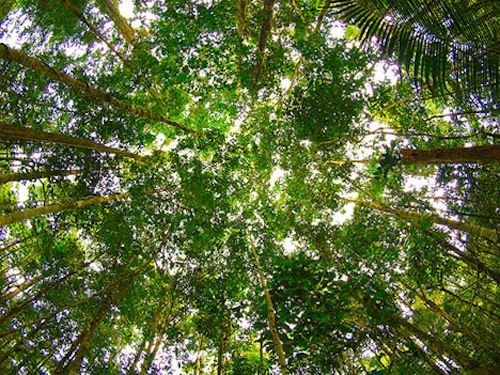On the Amazon, Renegade Activity, and the Futile
BY Idra Novey

I recently saw an Al Jazeera documentary about Ana Rafaela D’Amico, a 27-year-old Brazilian woman who directs an NGO trying to save one of the smallest but most threatened national parks in the Amazon. In the documentary, D’Amico trudges deep into the rainforest to hammer in signs and hand out letters stating the fines for illegal logging. But the illegal loggers, when she finds them, can’t pay the fines. They are poor frontmen who do this work because it is the only option they have to feed their families. The logging companies who hire them pay off local government officials to make it impossible for an NGO like D’Amico’s to go after them. Brazil’s efforts to get other countries to help save the trees that clean the air we all breathe reached an impasse when the U.S. refused to corporate.
And so Ana Rafaela D’Amico does what she can, hammering in sign after sign, handing out letter after letter, throughout the rainforest. One does, George Oppen said, what one is most moved to do. And he’s right, as Oppen so often is. I strongly believe one should never not do something on the grounds of futility.
In Bianca Stone’s recent post about the new press WONDER, she says, “The rise of the small-press is upon us and resources are bountiful for the creative-driven enterprise that wants to focus on new methods of presenting poetry.” Will the books these presses create last? What does “last” mean, or matter, in an era of infinitely available texts? People have been saying for years that poetry is dying or dead already, that it is futile to go to great lengths on its behalf.
But look at Alice James Books. Forty years ago, a few poets started the cooperative press to find new ways to publish books by women and named it after Henry James’s sister. Over the next four decades, the press occasionally lost direction. It nearly folded several times but there was always someone who cared enough to keep it going and it’s now publishing more poetry and with a bigger budget than ever before.
The way the world needs poetry is not so different from the way it needs the Amazon. Their significance to our existence is impossible to measure scientifically but people die for lack of what can be found in them. The comparison has its limits, obviously, but I found the documentary about D’Amico revealing. When the cameraman for Al Jazeera asks her about the possible futility of the signs she posts and the letters she distributes she answered calmly that giving up on the rainforest in Rondonia was not an option. Not for her. She said she couldn’t imagine going back to some lab in São Paulo and doing nothing but generating data about how quickly the rainforest is disappearing. She was determined to carry out more missions and do mightily by whatever trees were still rising in the park. “There are things,” Oppen wrote, “We live among ‘and to see them/ Is to know ourselves’.”
Idra Novey is a novelist, poet, and translator. Her collections include Take What You Need (Viking, ...
Read Full Biography

